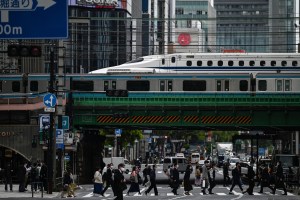A Japanese train driver is taking his employer to court for 56 yen ($0.49) in docked wages, a fine he paid after causing a one-minute delay on the remarkably punctual Japanese rail system.
On June 18 last year, the unnamed employee was supposed to drive an empty train arriving in a station in the southern city of Okayama into a depot. But the man went to the wrong platform and took over the train later than scheduled, causing a one-minute delay in the train’s departure.
Videos by VICE
His employer, Japan Railways (JR) West, has argued that he should be penalized because he did not work for that minute. The man filed the case at the Okayama district court in March, and is also suing for 2.2 million yen ($19,300) in compensation for alleged mental anguish caused by this ordeal. JR West was not immediately available for comment.
Japanese trains are renowned for being extremely punctual, and operators often punish employees for the smallest mistakes.
In May, a Japanese bullet train driver was reprimanded for taking a three-minute bathroom break after experiencing intense stomach pains. His employer called his actions “extremely inappropriate,” and apologized for his actions.
In 2017, a Japanese train company issued an apology after a train departed 20 seconds earlier than scheduled.
For this case, the JR West employee was originally fined 85 yen for a two-minute holdup, as the train departed from the station one minute later than scheduled and subsequently arrived at the train depot a minute late.
But after taking his case to the Okayama Labour Standards Inspection Office, a government office that deals with workplace disputes, JR West reduced the fine to 43 yen ($0.38)—a penalty for missing one minute of work.
Unable to dismiss the fine entirely, the man decided to sue for the unpaid wages, an additional 13 yen ($0.11) in overtime caused by the delay, and 2.2 million yen for what he said was mental anguish caused by the fines.
In the lawsuit, JR West cited its “no work, no pay” principle to explain the employee’s wage cuts, the same reason used to cut a driver’s pay for being absent or late for work, Yomiuri Shimbun reported.
The suing employee has criticized this policy and argued it shouldn’t apply to his unintended mistake. He also emphasized that because the train was simply entering the depot, the delay didn’t affect other train schedules and operations.







